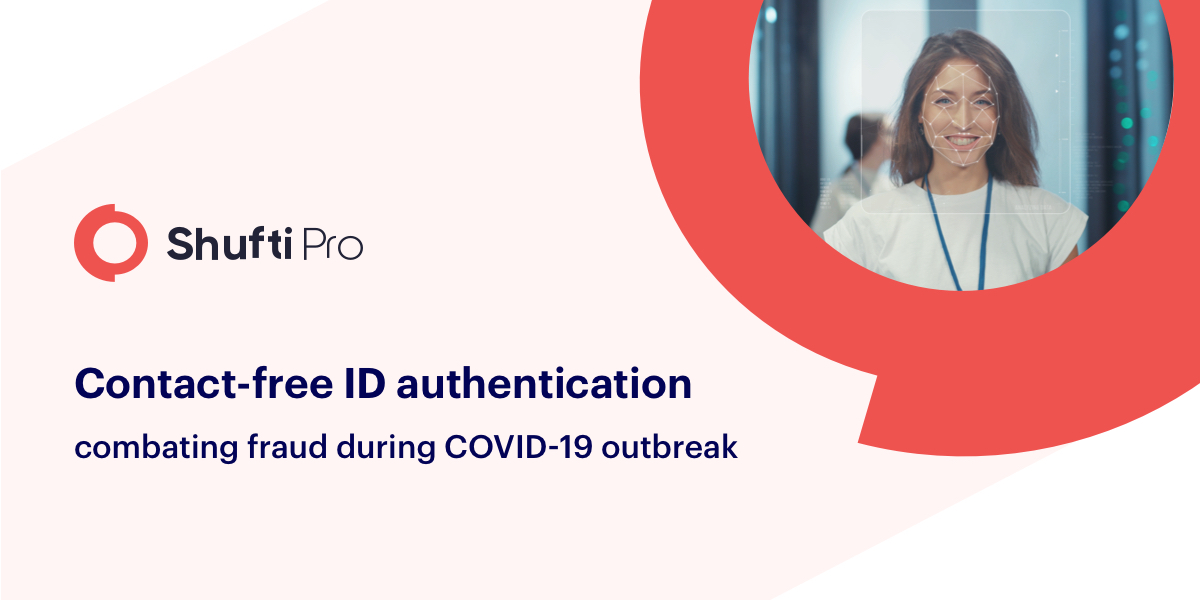Contact-free ID authentication – combating fraud during COVID-19 outbreak

Coronavirus outbreak, which was initially thought of as some sort of common flu in the Chinese city of Wuhan, has now spread across 209 countries around the globe. It is responsible for taking the lives of more than 126,776 people worldwide, as of now. According to worldometer, the top five most affected countries include the USA, Spain, Italy, Germany, and France.
Coronavirus is the foremost topic of discussion nowadays. The World Health Organization (WHO) has strictly advised people to stay indoors and avoid all sorts of social interaction. As per the instructions of the WHO, various federal and state governments have imposed a lockdown in their territories, urging citizens to practice social distancing.
All these restrictions are imposed for the greater good but it has affected businesses the most. Many companies are going out of business, and others are thriving through remote work or limited operations. But these restrictions are not the only issue, as cybercrime is on the rise. An In-depth ID authentication of prospects is vital to satisfy KYC obligations and to mitigate these frauds, but manual verification is not possible and digital ID verification needs robust technical setup to catch ever-evolving frauds.
Airports, hospitals, utility stores, research centers, public offices are operating in this crisis but are in dire need for contactless ID authentication to fight frauds, discussed above.
Impact of the COVID-19
The deadly Coronavirus is not only impacting human lives but the global economy as well. The outbreak has posed a major problem for all sorts of businesses and they’re incurring losses of millions of dollars every day. According to Business Insider, the CEO of Burberry, the luxury fashion brand, stated that the outbreak has negatively affected the luxury demand. Twenty-four of the brand’s 64 stores in mainland China are closed, while the 40 remaining locations are running under reduced hours with significant footfall declines. Similarly, other multinational giants such as McDonald’s, Starbucks, Adidas, etc have also reported a huge reduction in sales.
The majority of the workers are on a zero-hours contract and hence, are out of work currently. As a result, they are greatly suffering due to their low incomes and poor living conditions. The government and NGOs are trying their best to solve their issues and provide them with the basic facilities to fight the epidemic.
Nobody truly knows when the COVID-19 outbreak would come under control or businesses would re-open. According to a survey, 10 percent of the businesses claimed losing over $70 million per day. It would take months, perhaps years to recover the losses incurred.
Exploitation by criminals
While the world is going through a crucial time and people are fighting for their lives, criminals are exploiting this crisis. New groups of cybercriminals and hackers have emerged that are targeting people of all ages, primarily focusing on those that are working from home. Fraudsters are using a wide range of scam tools to defraud online users. They are closely following the headlines, adapting their messages and tactics as new medical and economic concerns emerge.
According to the Guardian, 500+ Coronavirus-related scams and over 2,000 phishing attempts by cyber criminals aiming to take advantage of the panic over the epidemic have been reported to the United Kingdom authorities. One of the newest frauds analyzed by officials at the National Fraud Intelligence Bureau (NFIB) involves fraudsters demanding donations to assist the NHS combat COVID-19. As of April 13, the Federal Trade Commission (FTC) had received 17,425 consumer complaints in regards to the COVID-19 epidemic. The total amount includes about 9,600 fraud complaints, with victims reporting losses of more than $13 million.
There is a dire need for proper identity verification procedures in all sectors to impede the attack of criminals. Banking customers, employees in firms, doctors, and nurses in hospitals, students in educational institutes, government officials and even online customers need to have their identities verified to prevent the hackers and identity thieves from manipulating the system.
Contact-free Authentication – A Measure to Impede Fraudsters
Due to the ongoing situation, businesses need to consider the use of contact-free authentication as a method of the customer and employee verification. Technology can prove to be an effective solution for state institutions and businesses, not only because it’s safe to use but user-friendly as well. Users can be verified within seconds without any assistance from the staff in the airport, utility store, or hospital. Businesses can onboard remote customers in real-time without any in-person interaction with them.
E-wallets, digital identity verification, and online KYC are some of the common examples of how contact-free verification technology is now being integrated into some institutions and businesses. It fulfills the KYC and fraud prevention needs of a wide variety of industries, such as traveling, hoteling, security, banking, education, medicine, and online retail.
Coronavirus will take some time but will subside eventually. For state institutions, banks and businesses, the best approach would be to incorporate contact-free ID authentication in their business operations to protect themselves and their customers. COVID-19 has highlighted the need for a digital transformation in traditional customer due to diligence measures.

 Explore Now
Explore Now













